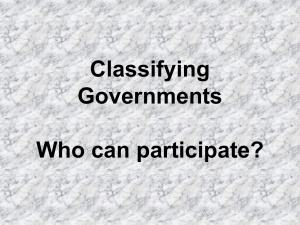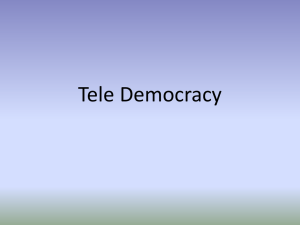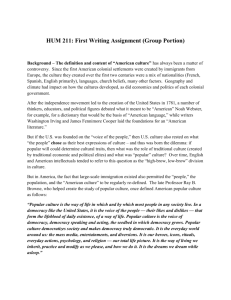Illusions_of_democracy
advertisement
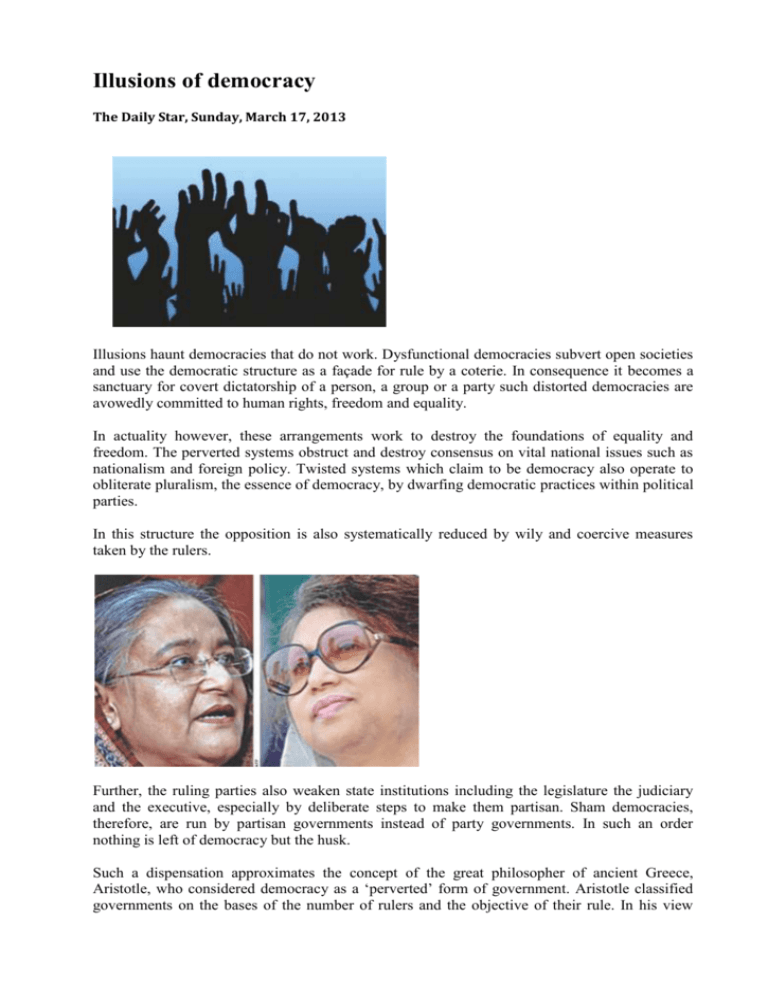
Illusions of democracy The Daily Star, Sunday, March 17, 2013 Illusions haunt democracies that do not work. Dysfunctional democracies subvert open societies and use the democratic structure as a façade for rule by a coterie. In consequence it becomes a sanctuary for covert dictatorship of a person, a group or a party such distorted democracies are avowedly committed to human rights, freedom and equality. In actuality however, these arrangements work to destroy the foundations of equality and freedom. The perverted systems obstruct and destroy consensus on vital national issues such as nationalism and foreign policy. Twisted systems which claim to be democracy also operate to obliterate pluralism, the essence of democracy, by dwarfing democratic practices within political parties. In this structure the opposition is also systematically reduced by wily and coercive measures taken by the rulers. Further, the ruling parties also weaken state institutions including the legislature the judiciary and the executive, especially by deliberate steps to make them partisan. Sham democracies, therefore, are run by partisan governments instead of party governments. In such an order nothing is left of democracy but the husk. Such a dispensation approximates the concept of the great philosopher of ancient Greece, Aristotle, who considered democracy as a ‘perverted’ form of government. Aristotle classified governments on the bases of the number of rulers and the objective of their rule. In his view when one man rules for the good of the people the government is a monarchy. Conversely, when rule by a single person is not geared to the common good it is a tyranny. Again, rule by a few aimed at general welfare is aristocracy which in its perverted form is called oligarchy. Further, according to the Aristotelian scheme rule by many when it serves the common good is ‘Polity’, but when it is perverted it is called “Democracy.” Aristotle also describes democracy as “a rule of the numerous poor”. He further observed, “it is inevitable that a constitution under which the poor rule should be democracy.” “Its issue is ideally freedom from interference of government and failing that, such freedom, as comes from the interchange of ruling and being ruled (which) contributes . . . to a general system of liberty based on equality.” Aristotle’s teacher Plato also displayed mild disapproval of democracy. He described democracy as “an agreeable anarchic form of society, with plenty of variety which treats all men as equal whether they are or not.” It is a matter of great curiosity that Plato and Aristotle, citizens of the fabled democracy of the Athenian city state, looked at democracy with reservation and disfavour. Many ancient Greek city states were direct democracies where the entire citizenry acted as decision makers. The small number of citizens made this possible thus ensuring full participation by all, the very essence of a democratic society. The Essence of Representative Democracy By contrast, modern large and populous states are not in a position to practice direct democracy. Representative democracy is the order of the day and representation offers scope for distortion. Much may be and is lost in the process of transmission. When such loss is magnified by myopic, incompetent or ill motivated leaders politics is deformed and democracy derailed. Could it be that Plato, Aristotle and their likes of ancient times had premonition of such distortions? One does not know. Nevertheless, the optimum working of large representative democracies is often hindered by a lack of understanding of the comprehensive concept of democracy. In cases where such hindrance is great the system degenerates and illusions replace reality. The concept of democracy particularly representative democracy has been enunciated in different ways by noted thinkers in recent centuries. Thus, the 17th century English political philosopher John Locke remarked “The majority, having upon man’s first uniting into society, the whole power of the community naturally in them, may employ all that power in making laws for the community from time to time and executing these laws by officers of their own appointing and then the form of government is a perfect democracy.” Political thinker John Stuart Mill (writing in 1859-60) appropriately underscored the necessity of representative government in democracy. He observed “The only government which can fully satisfy all the exigencies of the social state is the one in which the whole people participate… But since all cannot… participate in any but very minor portions of the public business, it follows that the ideal type of perfect government must be representative.” Political systems of representative-democratic nature work best when the socio-cultural matrix is congenial to these. The practitioners, both the leaders and the led have to appreciate the inevitable necessity of creating the right socio-political and cultural atmosphere. As a modern political analyst L.T. Hobhouse points out, “Democracy is not merely the government of a majority. It is rather the government which best expresses the community as a whole, and towards this ideal, the power assigned legally to the majority is merely a mechanical means”. Sociologist Mc Iver further clarifies,”In a democracy people control…government becomes an agent and the people the principal who holds it to account… democracy is not a way of governing whether by majority or otherwise but primarily a way of determining who shall govern and to what ends.” Social Scientist Karl Manheim focuses on the broad cultural principles which form the bases of democracy. He aptly observes: “Political democracy is merely one manifestation of a pervasive cultural principle…(it) postulates the sharing of governmental powers by all because it is convinced of the equality of all men and rejects all vertical division of society into higher or lower orders. This belief in essential equality of human beings is the first fundamental principle of democracy.” Democratic culture requires continuous practice of the values of human equality, rule of law, justice and fair play and tolerance of differing views and opinions. It is built on the foundations of general consensus on basic socio-political and economic matters. Its manifestations are both domestic and external. Within the nations it is reflected in consensual approach of major political forces towards principal issues of national life although it does not preclude difference of strategies and stress. In external affairs such a culture is expressed in what has been described as bipartisanship. This means a community of comprehension and approach among major political parties with regard to the dealings of the nation with other nations and the world at large. Illusory Democracies Democracies characterised by illusions rather than realities of democratic system have been described as “illiberal” or “uncertain” democracies. In these distorted systems political parties and their leaders do not help build and preserve national consensus on basic issues. Differing viewpoints do not find mutual accommodation. Intolerance vitiates the political and social environment. Dissention and disunity become the order of the day. In consequence, political parties advocating differing ideologies and programmes attempt to draw peoples support not by democratic persuasion but by force, overt or covert. Their political strategies are, therefore, often a mix of craft and coercion. In this dispensation, capture of state power becomes the priority and preoccupation of political leaders and parties. They use or more correctly, abuse this power for achieving their own interests rather than those of the people. The combat for power, in a representative democracy, transforms even free and fair elections in to zero-sum games in which the ‘winner takes all.’ The defeated opposition becomes a target for oppression and maximum exclusion. In consequence, democracy is weakened and the viability of the ruling elite and even of the democratic state is threatened. Iron Law of Oligarchy Such processes, in varying degrees of intensity, have been witnessed in recent decades in Bangladesh, Sri Lanka, Ivory Coast, Zimbabwe and other countries featured by lack of political development. In these avowedly democratic states competition for state power degenerates into naked and crude combat. In these cases ruling parties are virtual victims of Robert Michels Iron law of oligarchy. This political theory enunciated by German syndicalist sociologist in his 1911 book, political parties claims that “rule by an elite,” or “oligarchy,” is inevitable as an “iron law” within any organisation as part of the “tactical and technical necessities” of organisation. Michels particularly addressed the application of this law to representative democracy, and stated: “It is organisation which gives birth to the dominion of the elected over the electors, of the mandataries over the mandators, of the delegates over the delegators. Who says organisation, says oligarchy.” He went on to state that “Historical evolution mocks all the prophylactic measures that have been adopted for the prevention of oligarchy.” Michels stated that the official goal of representative democracy of eliminating elite rule was impossible, that representative democracy is a façade legitimising the rule of a particular elite, and that elite rule, that he refers to as oligarchy, is inevitable. For the organisation to function effectively, centralisation has to occur and power will end up in the hands of a few. Those few — the oligarchy — will use all means necessary to preserve and further increase their power. As Michels further elaborated, “Bureaucracy by design leads to centralisation of power by the leaders. Leaders also have control over sanctions and rewards. They tend to promote those who share their opinions, which inevitably leads to self-perpetuating oligarchy. People achieve leadership positions because they have above-average political skill. As they advance in their careers, their power and prestige increases. Leaders control the information that flows down the channels of communication, censoring what they do not want the rank-and-file to know. Leaders will also dedicate significant resources to persuade the rankand-file of the rightness of their views. This is compatible with most societies: people are taught to obey those in positions of authority. Therefore, the rank and file show little initiative, and wait for the leaders to exercise their judgment and issue directives to follow.” Charisma, Dynastic Links Power and Patron-Client Networks Political systems in which illusions rather than the substance of democracy dominates, elective autocracy becomes the Centre-Piece. In this order strength often flows from the top leaders adorned by charisma and, in some instances, by dynastic credentials. This leads to the creation of personal leadership whose over powering influence supported by coteries of secondary leaders, limit the scope of democracy. As Robert Michels described in a different context, the new autocracy supported by a collaborative oligarchy sets up and elaborate patron-client network. Patron-client relationship is build between the ruling party and various key segments of the state and society. The rulers fabricate a frame work of virtual neo-patrimonialism. Here in essence, consent and legitimacy do not flow from primordial values, as in patrimonialism but from money, opportunities and protection. There may be façade of deference and consent. The essence of patron-client relationship is personalised control over resources, opportunities and decisions, factional mobilisation and contestation. Politics in states such as Bangladesh, Sri Lanka, Pakistan and several African countries is characterised by patron-client networks which have been enhanced by the expanse and strength of informal governance. The contenders, both winners and losers, in national elections, do not seem to have confidence in normal politics and in the effectiveness of their respective party in maintaining or acquiring power. In consequence, the competition for power becomes distorted and polluted. The leaders of the ruling party try to secure their positions and ensure victory in the subsequent elections by arrogating to themselves a monopoly of state resources. Important institutions of the state are brought under the overpowering control and domination of the ruling party. This enables it to distribute favours to its clients who as beneficiaries in key positions in bureaucracy, business and professions are expected to help the patron, i.e., the ruling party in maintaining and prolonging its rule. This process creates a negative impact on the flowering of competitive open market economy, the companion of modern pluralist democracy. Political patronage rather than competent competition distorts economic freedom and restricts opportunities for free enterprise. Crony capitalism and comprador plunder not only stunt the flowering of democracy but also eat into the vitals of the economy. Corruption and fraud permeate politics, administration and business. It is obvious in such a situation that real democracy can not take roots, and is unable to develop and flourish. Illusions of democracy bewilder, confuse and frustrate the common citizens. Is there a way out? There is if the physicians heal themselves. Either the existing political class must correct and purify itself or a new breed of politicians must take over leadership. Is this a dream? If it is, then its realisation alone can drive away the illusions and bring forth real and meaningful democracy in the countries concerned. The writer founder Chairman of Centre for Development Research, Bangladesh (CDRB), former member of the erstwhile Civil Service of Pakistan (CSP) and former non-partisan technocrat Cabinet Minister of Bangladesh.


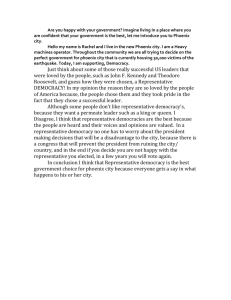

![“The Progress of invention is really a threat [to monarchy]. Whenever](http://s2.studylib.net/store/data/005328855_1-dcf2226918c1b7efad661cb19485529d-300x300.png)
